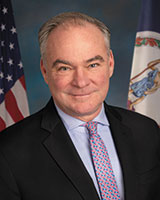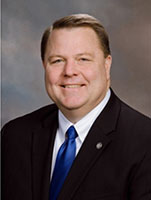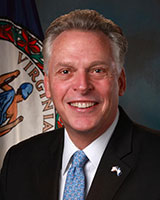Is Trump good for business?
Will voters tell president ‘You’re fired’ or hire him for second term?
Mason Adams //September 28, 2020//
Is Trump good for business?
Will voters tell president ‘You’re fired’ or hire him for second term?
Mason Adams //September 28, 2020//
President Donald Trump entered the White House in 2017 with no political experience but a lifetime spent in business.
Nearly four years later, with the incumbent Republican president up for reelection against Democrat Joe Biden, a former vice president who has been in politics for 50 years, Virginia voters are asking themselves: Is Donald Trump good for business in the commonwealth?
The answer, of course, varies by sector, geography, worldview and — perhaps most importantly — political identity. And it depends on what lens you use to answer the question.

“With Trump more than most presidents, you have to separate his personality from his policy,” says Larry Sabato, founder and director of the University of Virginia Center for Politics. “We all know the personality — the offensiveness to so many people and groups and states. But the policies, I would say, have certainly favored business — mainly big business, but also small businesses to some degree.”
Many businesspeople give Trump “a very high grade on policy that affects them,” Sabato says, “and a very low grade on character and personality.”

Most businesses now are focused on recovery from the coronavirus pandemic and the accompanying economic cratering, says Chris Saxman, executive director of the nonpartisan, business advocacy nonprofit Virginia FREE.
“It’s hard to suggest otherwise that Trump wasn’t good for business,” says Saxman, a former Republican state delegate. “On the regulatory front, he’s been a help to a lot of businesses. He’s certainly helped out certain sectors over others. The operative question is, is he going to be better than Biden? It’s tough to tell. Either one as president will want a pro-growth platform to get the economy growing out of the coronavirus pandemic. Regardless of Biden or Trump, the No. 1 priority is the virus.”
Many businesses that Virginia Business contacted for this report declined to comment, expressing concerns about triggering a backlash among pro- or anti-Trump customers, which they feared could have repercussions for their bottom lines. Some worried they could be called out in one of Trump’s tweets.
Ask Democrats and Republicans about whether Trump has been good for Virginia business, and the answer is predictably partisan.
“With President Trump in the White House, business has been booming in Virginia, despite Gov. [Ralph] Northam’s constant caving to the radical left,” says Samantha Zager, the Trump campaign’s deputy national press secretary. “The president’s tax cuts, deregulation and pro-growth policies have strengthened Virginia’s economy and created new jobs that have benefited workers and middle class families in the state.”

“There hasn’t been a president in the last couple of decades that has been as good on the economy as President Trump,” opines Landon “Tucker” Davis, a Southwest Virginia Republican and ardent Trump supporter who is executive director of the state branch of the America Rising political action committee.
“He’s kept his promises made in 2016,” said Davis, who served on Trump’s 2016 campaign and inaugural committee and was a Trump appointee in the Department of the Interior. “People said they were lofty and couldn’t be done, but he grabbed the bull by the horns and kept his promise to the hardworking men and women in America.”
Democrats have an entirely different take on the last four years.
“The Trump administration has failed Virginia’s small businesses and working families,” says Chris Bolling, the Biden campaign’s Virginia state director. “From his trillion-dollar tax cut for the rich to his disastrous trade wars to his reckless mishandling of the pandemic, which has disproportionately hurt Black and Latino Virginians, Trump has only brought pain to our communities and our economy.”

“First of all, it’s daily chaos at the White House: one decision today, another decision the next day. There’s no stability, no continuity,” says former Gov. Terry McAuliffe, speaking as a surrogate for the Biden campaign. “On a given day, you have no idea what this president is going to do, if he’s going to antagonize one of our allies, one of our trading partners. With Joe Biden, who’s got strong relationships on a global basis, first-name basis with almost every leader of the globe, we’ll have stability.”
Biden’s campaign is built largely around positioning himself as a stable, reasonable alternative to Trump, based on his experience as a vice president and seven-term U.S. senator. The central business-related plank in Biden’s platform is a comprehensive, $2 trillion infrastructure package based on clean energy and modernizing transportation — or in campaign marketing terms, to “Build Back Better.”
Biden is also trying to make the race into a referendum on Trump’s competency, with the Democrat criticizing Trump for “failures of judgment” and “repeated rejection of science” in the president’s response to the pandemic.
Trump’s campaign, on the other hand, argues that the president is tougher on law and order, attacking Biden by using video footage of Black Lives Matter protests and social unrest in cities around America to suggest that a Biden presidency would be disruptive, not stabilizing. The Trump campaign has sent texts warning that Antifa will “attack your homes if Joe’s elected.” Another Trump campaign ad called on voters “to stop Joe Biden and his rioters,” accompanied by a photo of Biden kneeling alongside Black leaders.
The president’s critics point out that all the unrest has happened under Trump’s watch and accuse him of fanning the flames of divisiveness and incivility.
Whose economy was it, anyway?
Making the case against Trump, U.S. Sen. Tim Kaine paraphrases Ronald Reagan’s closing 1980 debate argument against then-President Jimmy Carter, asking if Virginians are better off now than they were four years ago.

“The number of people employed is lower. The unemployment rate is higher. The federal deficit is higher,” says Kaine, a former Virginia governor who was Hillary Clinton’s running mate during her 2016 presidential bid against Trump. “The only thing you put in this column that’s a plus, if you’re just measuring by results, is the stock market is also higher.”
The national debt is now at $26.8 trillion, up from $19.9 trillion when Trump entered office, and the annual budget deficit is projected to reach a record $3.3 trillion this year, according to the Congressional Budget Office.
When Trump was inaugurated in 2017, the United States had seen 75 months of consecutive job growth under President Barack Obama. In Virginia, 4.1 million people were employed; and the unemployment rate was 4%.
The U. S. saw an additional 38 months of job growth under Trump before the pandemic slammed the economy. In February, the last full month before COVID-19 shut down the economy, 4.3 million Virginians were employed, and the unemployment rate was 2.6%. The U.S. had seen more than 10 years of economic growth — the longest unbroken expansion in American history.
Economic growth averaged 2% during Obama’s eight years as president, including when the country was slowly climbing out of the Great Recession. Through January 2020, economic growth under Trump was 2.1% — slightly better than Obama, but less than Trump’s promise of 4% growth.
Despite these figures, Republicans credit the pre-pandemic economy to Trump.

“Whether you like him or not, everyone has prospered under Donald Trump,” says state Sen. Amanda Chase, a Chesterfield County Republican who is seeking the GOP nomination for governor. “Everyone can look at their bottom line. It’s been the most robust economy we’ve seen in decades.”
Financial meltdown
The pandemic has dominated 2020 in unexpected, unprecedented ways. Virginia’s unemployment rate skyrocketed to 11.2% in April as the economic shutdown took hold. The number of unemployed Virginians soared from 117,249 in February to 482,111 just two months later. As of late August, nearly 250,000 Virginians remained unemployed — more than twice as many as in August 2019.
The leisure and hospitality sectors took the biggest hits during the pandemic, followed by other service industries. Those sectors have led in job gains since April, but by July they employed 91,300 fewer workers in Virginia than the summer before — a 22% drop. In June, McKinsey & Co. projected that the hotel industry may not recover to pre-pandemic levels until 2023, or even later.
Christopher Nassetta, president and CEO of McLean-based Hilton Worldwide Holdings Inc., has said that it may take a few years for the hotel industry to recover from the pandemic. Hilton, which recorded a $430 million net loss in the second quarter of 2020, laid off 22% of its global corporate workforce, or about 2,100 employees, in June.
Yet hospitality industry analyst STR Inc. also noted spots of hope, including the national hotel industry reaching 50% occupancy in mid-August for the first time since the economic shutdown started. (The industry was still down 30% from August 2019, however.)
By contrast, sectors connected to the federal government have continued with relatively little disruption, propelled by the $2.2 trillion CARES (Coronavirus Aid, Relief, and Economic Security) Act that Congress passed in March. According to the Virginia Employment Commission, federal government jobs increased 1.3% from July 2019 to July 2020, even as total nonfarm employment fell 7% over that same period.
“There’s a lot of money going to Northern Virginia,” Saxman says. “We put a lot of money into defense. Cybersecurity was built out. There’s a lot of financing through very cheap interest rates. The Federal Reserve has a lot to do with this. They’re printing money out the wazoo.”
Defense spending is a critical part of the Northern Virginia economy. Trump has increased annual defense spending from $606 billion to $738 billion. (By comparison, U.S. defense spending under the Obama administration peaked in 2011 at $711 billion.)
The buffering of government-related sectors and a still-thriving stock market can’t mask the fact that the pandemic and related economic downturn threaten the survival of businesses both big and small across Virginia, however. The nonprofit National Bureau of Economic Research estimated that by early May, about 110,000 U.S. small businesses closed permanently due to the pandemic.
“Our consulting business is hanging on by a thread,” says Carrie Ann Alford, co-founder of Alexandria-based Torii Coaching and Consulting. Alford served three years as an aide to then-state Sen. Linda “Toddy” Puller, a Northern Virginia Democrat, and five years in the Virginia Department of Veterans Services before leaving to form her business.

“The way the president and [U.S.] Senate have really let [the pandemic] get away from them, the way they just handed over all of the accountability and power to the states has really hindered businesses’ ability to get back on their feet,” Alford says. “We’re acting like 50 independent entities saying, ‘I’m going to take care of me. Screw you.’ It’s creating all this tension in the business community. I’m quite frankly very concerned about the future of our business.”
Republicans say Trump responded well to an atmosphere in which science and public health recommendations shifted directions over the course of the pandemic’s early weeks.

“This thing changes in terms of what you need to do day by day,” says retired Republican state Sen. Bill Carrico, who’s considering a run for governor next year. “He’s allowed states to look at it and put policies in place for how it’s affecting them. I don’t think there’s a whole lot on the federal level that he could do other than offer assistance to the states to get them through the process.”
Democrats say Trump’s focus on shutting down travel was ineffective after the virus was already in America, and that his subsequent news conferences and tweets discouraged effective practices such as mask-wearing while spreading misinformation about unproven treatments such as hydroxychloroquine. He even wondered aloud during a news conference whether the coronavirus could be cured by injecting patients with bleach or irradiating them with ultraviolet light. (Doctors dismissed both of the latter ideas; Trump followed the suggestions by saying, “I’m not a doctor. But I’m, like, a person that has a good you-know-what.”)
During the Republican National Convention in August, several speakers referred to the pandemic in the past tense, praising Trump’s response to the crisis, despite the fact that as many as 250,000 Americans are projected to be dead from coronavirus by the November election. With just 4% of the world’s population, the U. S. accounts for 22% of global deaths from COVID-19.
In an August article in The New York Times, Dr. Peter J. Hotez, Baylor College of Medicine dean, said, “The Trump administration is responsible for the single worst public health failure in the past 100 years.”

McAuliffe calls Trump’s handling of the pandemic “a disaster” and says small businesses have been “crippled” by the president’s inaction and poor administration of the Paycheck Protection Program (PPP), which was part of the CARES Act.
Nearly 110,000 Virginia businesses received PPP loans, with roughly 93,000 receiving $150,000 or less, according to The Associated Press. Those businesses received somewhere between $9.5 billion and $18.2 billion — the Virginia Bankers Association (VBA) put the figure at more than $12.6 billion — out of $659 billion budgeted for the program.
Saxman allows that the Trump administration’s initial pandemic response was “ineffective” but says it has improved over time, lending a “ray of hope” to businesses trying to survive.
Taking care of business?
The first three years of Trump’s economic policy were marked largely by his approach to trade, which broke with the free trade approach of his White House predecessors.
Both the Virginia Farm Bureau and Virginia Chamber of Commerce endorsed Trump’s renegotiation of 1994’s North American Free Trade Agreement (NAFTA) into the United States-Mexico-Canada Agreement (USMCA), which went into effect July 1.
“The overhaul of NAFTA into the USMCA trade agreement was completely necessary and could not have come at a better time,” says Ben Rowe, national affairs coordinator at the Virginia Farm Bureau.
While agriculture as an industry will benefit from the USMCA, it has suffered from Trump’s trade war with China, which has seen the U.S. impose tariffs on China for unfair trade practices, including intellectual property theft.
Before Trump, soybeans were Virginia’s top export. Soybean exports to China, however, fell 83% from 2017 to 2018 due to tariffs that China imposed in retaliation for Trump raising levies on Chinese imports. Soybean prices fell below $8 a bushel in 2019 and had increased only to $9.01 by August 2020 — a nearly 50% drop from 2012, when they were $17.58.

Virginia’s agricultural exports to China fell from $700 million in 2016 to $235 million in 2018. And agriculture is just one front in a trade war that encompasses much of both countries’ economies.
Rowe says the trade war has cost farmers in the markets, but the Farm Bureau is optimistic about the Phase 1 trade deal, signed in January, which includes a Chinese commitment to purchase $200 billion in American goods above 2017 levels by the end of 2021.
The Trump administration also placed tariffs on steel from most countries. That hasn’t helped Virginia’s coal industry, which produces metallurgical coal used in steelmaking. The coal industry has suffered under a wave of bankruptcies. Blackjewel LLC’s abrupt closure in 2019 put 500 Virginia miners out of work.
Agriculture and coal significantly affect rural regions of Virginia that heavily supported Trump in the 2016 election, and which likely will do so again in 2020.
Over his career, Trump has cultivated the persona of a self-made billionaire who’s had a string of business triumphs — an image that persists in the minds of his supporters. But Trump received the equivalent of more than $400 million in today’s dollars from his father in payments that began at age 3. And he has taken his hotel and casino companies through six bankruptcies, not to mention failed ventures such as his Trump University real estate training program, which ended with Trump paying out $25 million in legal settlements.
“I’ve seen so many comments from people, average workers, who have been hurt during the Trump years, but disproportionately they say things like, ‘He’s trying. He’s fighting for me. Things aren’t good, but they’d be worse if the other side had won,’” Sabato said. “They think Trump is fighting on their behalf, no matter what he does.”
The Trump administration’s other big economic win was a 2017 tax cut package that was passed by Republican majorities in Congress. The Virginia Association of Counties called the Tax Cuts and Jobs Act the “largest federal tax reform legislation in over 30 years.”
Democrats argue that the tax cut’s most positive impacts were limited to those in the highest income brackets, while leaving the federal government fewer resources to respond during the pandemic and resulting recession.
The Trump presidency’s effects on the Virginia economy vary widely. But it’s unclear whether Trump’s business record will translate to votes, as people tend to base their votes more on social and emotional issues, as well as household economics.
“Business is very important to the economy for everybody,” says Sabato, “but it’s a relatively small piece of the overall electorate.”
See more from the cover package:
s

















